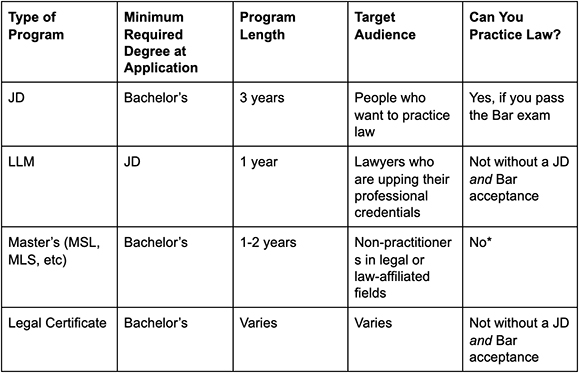What You Need to Know About the Different Law Degrees
- by
- Feb 26, 2020
- Law School, Law School Advice, Legal Jobs
- Reviewed by: Matt Riley


Eeny meeny miney…degree? Much as I’d like to believe that readers of this blog are only here to bask in the sparkling wit and charm of our lovely authors, I know a self-serving fallacy when I see one. We’re all here for one reason: To absolutely decimate the LSAT—Blueprint is great at that, BTW. But is that the only reason we’re here? What’s after the LSAT? More importantly, do you even need to take the LSAT?
Sometimes it’s worth taking a moment to remember that the LSAT is only an intermediary conclusion. After all, there’s still law school to conquer. But what exactly does that mean? Is a legal education just the LSAT, three years of law school, the Bar exam, and then you’re out the door and into practice? It certainly can be. But that’s not the only path out there. There are a number of “law degrees” out there and each one can determine if you’re capable of suing or getting sued.
When people talk about a “law degrees,” generally they have something quite specific in mind. But that doesn’t mean that there aren’t a number of options available to an enterprising legal scholar. Here’s a brief overview of some of the different programs that can contribute to a legal education.
What is a Juris Doctor (JD)?
A JD is the gold standard of a legal education. When you think of “law school,” this is the kind of program you’re likely picturing. Elle Woods got her JD in “Legally Blonde.” On “How to Get Away With Murder,” Viola Davis teaches students earning a JD.
According to LSAC, a JD degree is typically earned in three years, requires a Bachelor’s degree to enter, and often relies on a killer score on the LSAT in order to ensure admission—this is why you prep for the LSAT. A JD provides the background knowledge needed to pass the Bar exam, which allows lawyers to practice law in state and federal courts.
Most JD programs will cover a core set of courses, including contracts, torts, and civil procedure—concepts that make up a huge amount of what lawyers actually do when practicing law. Students fill out the rest of their class hours with electives in different areas of study, like environmental or international law. Regardless of focus, successful graduates of these programs walk out the door with a JD degree in hand, ready to take the Bar (hopefully), and then practice.
What is a Legum Magister (LLM) Degree?
But what about people who want to continue their legal education beyond a JD? An LLM program can be used to augment the legal education earned while pursuing a JD.
Augment is the keyword there: a JD is required for admission for an LLM program. (One might say that a JD is necessary to obtain an LLM. See what I did there? We have fun here at Most Strongly Supported.) LLM programs are aimed at lawyers who are seeking to deepen their professional credentials in a particular area of law, like taxation or human rights. An LLM might make a US attorney a more attractive hire for a particular law firm, or it could be used to help a lawyer from another country familiarize herself with U.S. law. These programs typically take one year to complete. Most law schools offer an LLM and some even offer joint or dual JD-LLM programs. However, whether or not you need an LLM is ultimately up to you and your career goals.
What is a Legal Certificate?
Legal certificate programs appeal to the widest group of potential students. Both practicing attorneys with a JD and people working in law-affiliated careers like court reporting can, and do, enroll in certificate programs. Some certificates are cross-disciplinary and available to business or med students.
These programs also tend to be on the shorter and more affordable ends of the spectrum of legal education. Before deciding on a Legal Certificate program, be sure to do your research to make sure that the program is aimed at the appropriate content and level of expertise. A paralegal hoping to expand her general knowledge of contracts is looking for a different program than a practicing attorney looking for a cybersecurity crash-course.
Master’s Degree
Let’s say that, theoretically, you’re someone who is deeply interested in the law, but might not be interested in being a practicing lawyer. A Master’s program may be what you’re looking for.
There are a few different degrees available for people in this position, including Master’s in Science in Law (MSL), Master of Legal Studies (MLS), and Juris Master (JM). Like other secondary degrees, candidates looking to apply for one of these programs should have a Bachelor’s degree. However, it is rare for students with a JD to pursue a Master’s degree of this kind.
The key difference between one of these Master’s degrees and an LLM is in how those degrees are used. Lawyers pursue an LLM as a professional degree; students earn an MSL or MLS in order to learn more about the law from a non-practicing point of view.
In summary, a chart:

*Note: currently four states allow people to take the Bar exam without going to law school—California, Vermont, Virginia, and Washington.
As you can see, not all law degrees make you a lawyer. The only sure-fire way to practice law is by going to law school and taking the bar exam. But, in order to get into law school, you’ll need to get a good score on the LSAT. Helping students to achieve that happens to be our forte. Schedule a free consultation with an LSAT Admissions Advisor, or start with our free LSAT prep resources, from a personalizable study planner to practice test with detailed analytics on where you need to improve. And check out our complete How to Become a Lawyer Guide.
Search the Blog

Free LSAT Practice Account
Sign up for a free Blueprint LSAT account and get access to a free trial of the Self-Paced Course and a free practice LSAT with a detailed score report, mind-blowing analytics, and explanatory videos.
Learn More
Popular Posts
-
logic games Game Over: LSAC Says Farewell to Logic Games
-
General LSAT Advice How to Get a 180 on the LSAT
-
Entertainment Revisiting Elle's LSAT Journey from Legally Blonde








